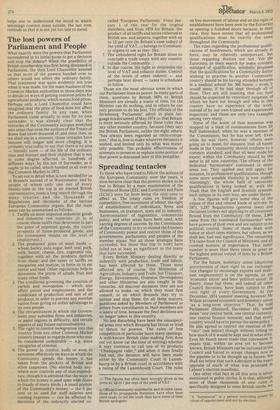The lost powers of Parliament and People
What exactly were the powers that Parliament surrendered in its initial haste to get a decision and stop the debate? When the possibility of British membership was first being discussed in Parliament, the then Lord Chancellor assured us that most of the powers handed over to others would not affect the ordinary family. That statement was quite evidently not true when it was made, for the main business of the Common Market authorities in those days was to decide on ways of getting common prices for agricultural products, which means food prices. Perhaps only a Lord Chancellor could have imagined that the price of food does not affect the ordinary family. In any case, when Parliament came actually to vote for its own surrender, it was already clear that the tentacles of the Community octopus stretched into areas that even the authors of the Treaty of Rome had never dreamed of, and since then, as we shall see in a moment, those tentacles have become still longer and more clinging. It is probably true today to say that there is no area — literally none — of the life of the ordinary man and woman and their children that is not in some degree affected, in hundreds of different ways, by the Act of Surrender, as it ought to be called, which handed us all over to the Common Market in 1972.
To set out in detail what is now decided for us in Brussels instead of in Westminster, and by people of whom only one out of every twenty-nine at the top is an elected British representative, needs a long search through the many treaties and the thousands of Regulations and 'decisions' of the various European Community organs. But the main areas can be summarised as follows: I. Tariffs on most imported industrial goods and industrial raw materials. (It is, of course, those tariffs that determine in part the price of imported goods, the export prospects of home-produced goods, and the consequent results on the level of employment.) 2. The producers' price of most foods — wheat, barley, oats, sugar, beef, veal, pork, milk, butter, cheese, rice, vegetable oils, together with all the products derived from these; and the taxes or tariffs on margarine and mutton, to force us to eat butter and beef. Other regulations help to determine the prices of salads, fruit and many other foods. 3. The conditions governing the creation of cartels and monopolies — which also affect prices and employment; and the conditions of production and sale of all products, in order to prevent any member nation from giving an unfair advantage to its own people.
4. The circumstances in which our Government may subsidise firms and industries, or assist regions in difficulty, and certain aspects of any future nationalisations. 5. The right to control immigration into this country from any other Common Market country (except as regards those who may be considered undesirable — e.g. some categories of criminal.
6. The power to control, audit or even to comment effectively on ways in which the Community spends the money it has taken from the pockets of British and other taxpayers. (No elected body anywhere now controls any of that expendi ture, though it is admitted that the ways in which the money is used open wide doors to frauds of many kinds.) A small portion of the Community's money — the 5 per cent or so used for staff salaries and running expenses — can be affected by decisions of the indirectly elected so called 'European Parliament.' From January 1 of this year for the original members, and from 1978 for Britain, the product of all tariffs and levies collected at British seaand airports, together with up to 12 per cent (in Britain's case today) of the yield of VAT, (1) belongs to Community organs to use as they like.
7. The unhindered right for Britain alone to conclude a trade treaty with any country outside the Community.
8. In due course, the right to determine the level of VAT and tobacco duties. Control of the levels of other indirect — and perhaps later direct — taxes is scheduled to follow.
Those are the most obvious areas in which our Parliament loses its power. In many parts of them, questions by British MPs to British Ministers are already a waste of time, for the Minister can do nothing, and in others he can only promise to do his best. The officials of the Strasbourg 'Parliament' admit in plain language in a document of May 1974 (2), that Britain is more seriously affected by these rules than any other member country, because (they say) the British Parliament, unlike the eight others, "has always been regarded as omni-competent," that is, free to make whatever decisions it wished, and limited only by what was materially possible. The probable effectiveness of attempts to preserve or replace some portion of that power is discussed later in this pamphlet.










































 Previous page
Previous page